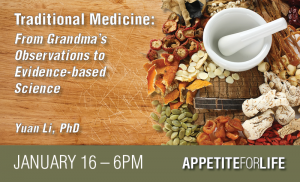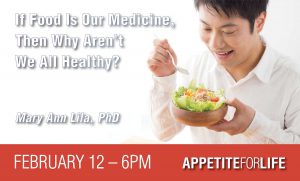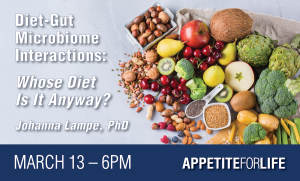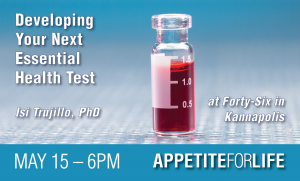 Appetite For Life – Wednesday, September 19, with Delisha Stewart, PhD, Assistant Professor of Nutrition, UNC NRI: “Race, Ethnicity, and Health Disparities”
Appetite For Life – Wednesday, September 19, with Delisha Stewart, PhD, Assistant Professor of Nutrition, UNC NRI: “Race, Ethnicity, and Health Disparities”
Scientists at the Nutrition Research Institute are studying the role of genetics in health and wellness. Epidemiology studies have shown that some groups of people are more likely to develop disease, and clinical studies have demonstrated that some individuals are more likely to have a positive response to treatment, or interventions compared to other individuals. A goal of our research is to understand what makes some individuals susceptible to disease, and how we can improve intervention and treatments for more positive outcomes. During this program, you will learn about differences in disease risks that are related to race and ethnicity, factors that are known to contribute to diversity in disease risks, modifiable behaviors that reduce the risks of developing disease, nutritional interventions that have been shown to diminish disease risks, and nutritional interventions that have the potential to improve health outcomes. View PowerPoint presentation. View video.
 Appetite For Life – Wednesday, October 17, 2018 at Johnson & Wales University-Charlotte: “Fun(ctional) Fall Flavors”
Appetite For Life – Wednesday, October 17, 2018 at Johnson & Wales University-Charlotte: “Fun(ctional) Fall Flavors”
In collaboration with Johnson & Wales University, we are pleased to present a very special event at the JWU campus in Center City Charlotte. Chef Megan Lambert, MS, RD, from Johnson & Wales and registered dietitian Steph Saullo, MS, RD from the NRI will come together to demonstrate delicious, healthy cooking while sharing tips for consuming a balanced, nutritious diet. Attendees will be able to sample the fare following the presentation. The location of the event is Hance Auditorium, Johnson & Wales University. View recipes. View nutrition notes. View Video.
 Appetite For Life – Wednesday, November 14, 2018 with Sandra Mooney, PhD, Associate Professor of Nutrition at UNC NRI: “Can Nutrition Improve Cognition?”
Appetite For Life – Wednesday, November 14, 2018 with Sandra Mooney, PhD, Associate Professor of Nutrition at UNC NRI: “Can Nutrition Improve Cognition?”
The developing brain is very sensitive to environmental influences. These can be positive, such as exercise or good nutrition, or negative, such as too much stress or exposure to some drugs. Most people are exposed to a combination of positive and negative environmental factors and are perfectly normal, but when the bad outweigh the good, normal brain development can be altered and this may be seen in the form of abnormal behavior. Dr Mooney will talk about some of the brain and behavior changes seen in the lab after exposure to alcohol, and some of her work looking at nutritional interventions that appear to improve these. View PowerPoint presentation. View video.
 Appetite For Life – Wednesday, January 16, 2019 with Yuan Li, PhD, Postdoctoral Research Associate-Sumner Lab: “Traditional Medicine: From Grandma’s Observations to Evidence-based Science”
Appetite For Life – Wednesday, January 16, 2019 with Yuan Li, PhD, Postdoctoral Research Associate-Sumner Lab: “Traditional Medicine: From Grandma’s Observations to Evidence-based Science”
The long-standing system of medical treatment in China, especially the use of herbs for disease prevention and treatment, has gained popularity in Europe and North America. Many herbs used in traditional medicine have not been sufficiently studied, and the mode of action of these herbs remains unknown. Evidence-based science is needed to move past grandma’s observations, and ensure an adequate understanding of the risks and benefits of herbal medicines. Dr. Li will talk about the history of TM research and provide examples from her own research program that uses cutting-edge methodologies to reveal the chemical ingredients in herbs, and how these ingredients influence biological function. View PowerPoint presentation. View video.
 Appetite For Life – Tuesday, February 12, 2019: “If Food Is Our Medicine, Then Why Aren’t We All Healthy?” presented by Mary Ann Lila, PhD, director, NCSU Plants for Human Health Institute, on the North Carolina Research Campus in Kannapolis, NC
Appetite For Life – Tuesday, February 12, 2019: “If Food Is Our Medicine, Then Why Aren’t We All Healthy?” presented by Mary Ann Lila, PhD, director, NCSU Plants for Human Health Institute, on the North Carolina Research Campus in Kannapolis, NC
There’s no question that plant foods (fruits, vegetables, and herbals) are able to synthesize complex chemical bioactive compounds (phytoactives) that are more sophisticated than any human synthetic chemist can create – and in many cases, more efficacious at preventing or treating chronic human diseases and metabolic disorders. Despite the fact that a wider diversity of produce than ever before is available to modern consumers, and ample evidence for effective disease prevention using certain diets is readily available in the popular press, the human race seems to be sliding down a slippery path to largely preventable ill-health. Why? One reason is the basic change that has occurred in both the plant and animal foods on offer in the supermarket – often quite a drastic change from a century ago. Wildcrafted plant foods that provided a plethora of phytoactives and nutrients have been transformed into blander, uniform produce with sometimes limited nutritive value. We’ve lost some of the critical nutrients and extranutritional components that were present in the wild. A second issue is related not to the foods, but to basic lifestyle choices in dietary habits and mobility. If plant science and food science research is expected to come up with answers to these conundrums, we can’t just ‘discover’, we have to deliver. Recent research has concentrated immunoprotective fruit and vegetable phytochemicals for delivery in convenient, and highly bioavailable functional food formats, e.g. colloidal protein-phytochemical aggregate particles, that can serve as unprecedented ingredients to reverse the nutritional deficits. Tests confirmed the favorable sensory properties of the ingredient, and recommended wider applications to counteract the negative trends of Western diets. Most recently, the phytoactive-protein ingredients were incorporated into snack food products with direct utility for meals in transit, and even for humanitarian aid efforts in undernourished populations. Simultaneously, the combination of phytoactive-protein particles addresses structural and formulation challenges (e.g. bar hardening, thermal degradation, or ingredient separations) that are current challenges in the industries. View PowerPoint presentation. View video.
 Appetite For Life – Wednesday, March 13, 2019: “Diet-Gut Microbiome Interactions: Whose diet is it anyway?” presented by Johanna Lampe, PhD, Full Member and Associate Division Director in the Public Health Sciences Division at Fred Hutchinson Cancer Research Center and a Research Professor in the Department of Epidemiology at the University of Washington in Seattle
Appetite For Life – Wednesday, March 13, 2019: “Diet-Gut Microbiome Interactions: Whose diet is it anyway?” presented by Johanna Lampe, PhD, Full Member and Associate Division Director in the Public Health Sciences Division at Fred Hutchinson Cancer Research Center and a Research Professor in the Department of Epidemiology at the University of Washington in Seattle
The human diet includes many types of compounds that are metabolized to varying degree by gut microbes. The interaction between dietary intake and the gut microbiome may influence cancer risk in humans. Many of the bioactives in plant foods that have been shown to prevent cancer in experimental animal models and are associated with lower cancer risk in human observational studies are metabolized by gut microbes to a variety of metabolites. In humans, wide ranges in circulating levels of these metabolites among individuals in response to a standard dose of a phytochemical suggest large interindividual variation in the gut microbial capacity to metabolize the parent compounds. Several classes of phytochemicals have been extensively studied for their potential role in cancer prevention. In the context of dietary interventions, we have shown that differences in gut microbial metabolism can substantially affect circulating levels of the bioactive metabolites and biomarkers of cancer risk. General recommendations encouraging people to consume diets rich in vegetables, fruit, whole grains, legumes, and nuts provide a foundation for cancer prevention, but do not necessarily assure adequate exposure to these bioactive compounds by the majority of individuals. Overall, the human gut microbiome plays an important role in host exposure to bioactives from plant foods and therefore possibly cancer risk. Understanding the impact of diet-microbial community interactions on cancer risk may help to guide future prevention strategies. View PowerPoint presentation. View video.
 Appetite For Life – Wednesday, April 17, 2019: “One Pan Wonders”
Appetite For Life – Wednesday, April 17, 2019: “One Pan Wonders”
In collaboration with Johnson & Wales University, we were pleased to present a very special event at the JWU campus in Center City Charlotte. Chef Megan Lambert, MS, RD, from Johnson & Wales and registered dietitian Steph Saullo, MS, RD from the NRI came together to demonstrate delicious, healthy one-pan meals while sharing tips for consuming a balanced, nutritious diet. Recipes Nutrition Notes View video.
 Appetite For Life – Wednesday, May 15, 2019: “Developing Your Next Essential Health Test” presented by Isi Trujillo, PhD, Postdoctoral Research Associate in the Zeisel Lab at the UNC Nutrition Research Institute
Appetite For Life – Wednesday, May 15, 2019: “Developing Your Next Essential Health Test” presented by Isi Trujillo, PhD, Postdoctoral Research Associate in the Zeisel Lab at the UNC Nutrition Research Institute
Choline, an essential nutrient obtained from the diet, is critical throughout a baby’s brain development. During adulthood, choline (found in eggs, liver, and chicken, for example) correlates with sharper memory. Sometimes, your choline intake may seem correct, but in some individuals it’s not enough: your genetic background plays a major role. People with variants in choline metabolism because of DNA misspellings make them susceptible to choline deficiency. In that case, how do you know how much choline is enough for you? The Zeisel Lab is developing a test to answer that question. Learn how this breakthrough in science is being developed right here at the NRI. View PowerPoint presentation View video.
